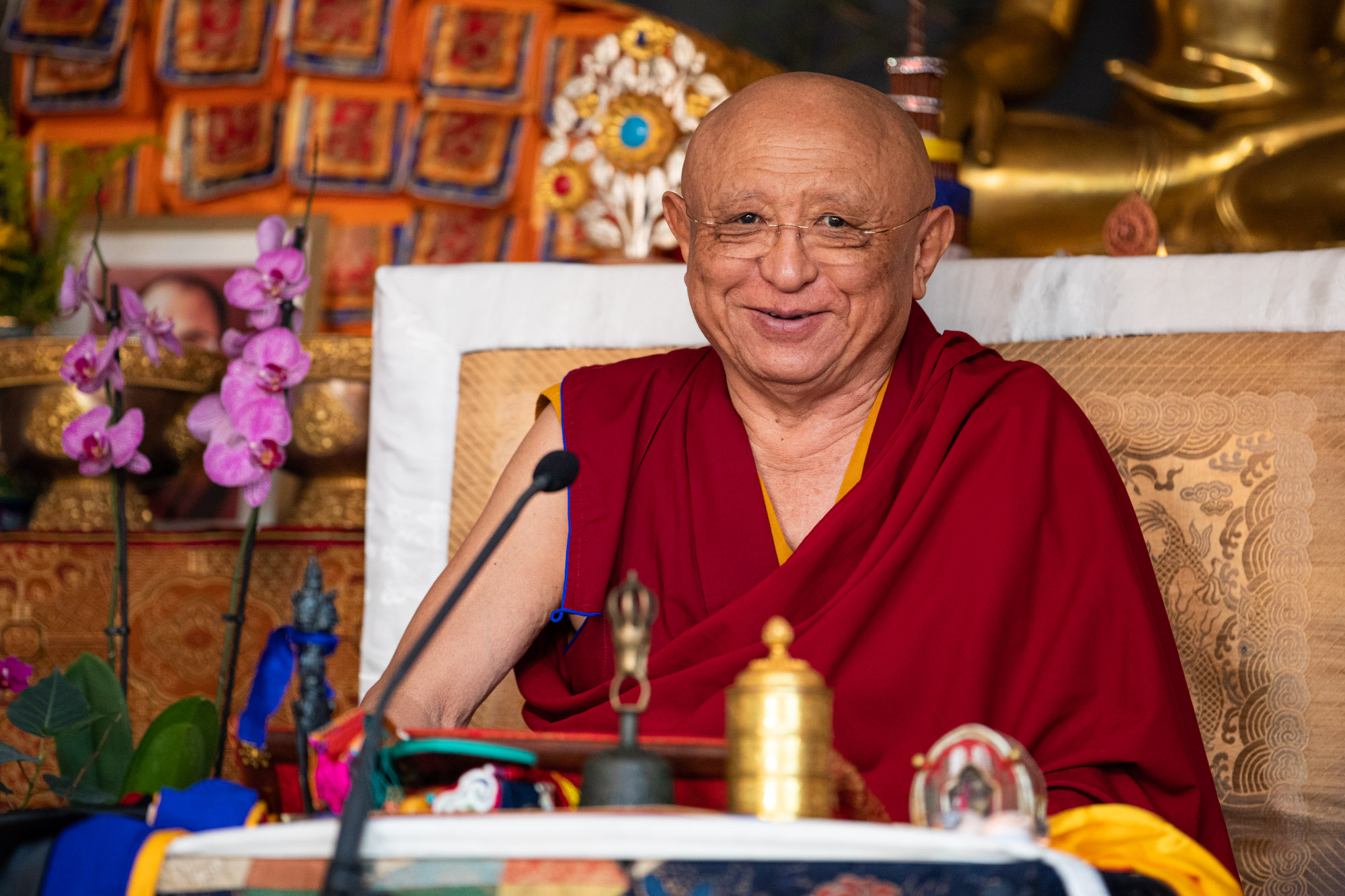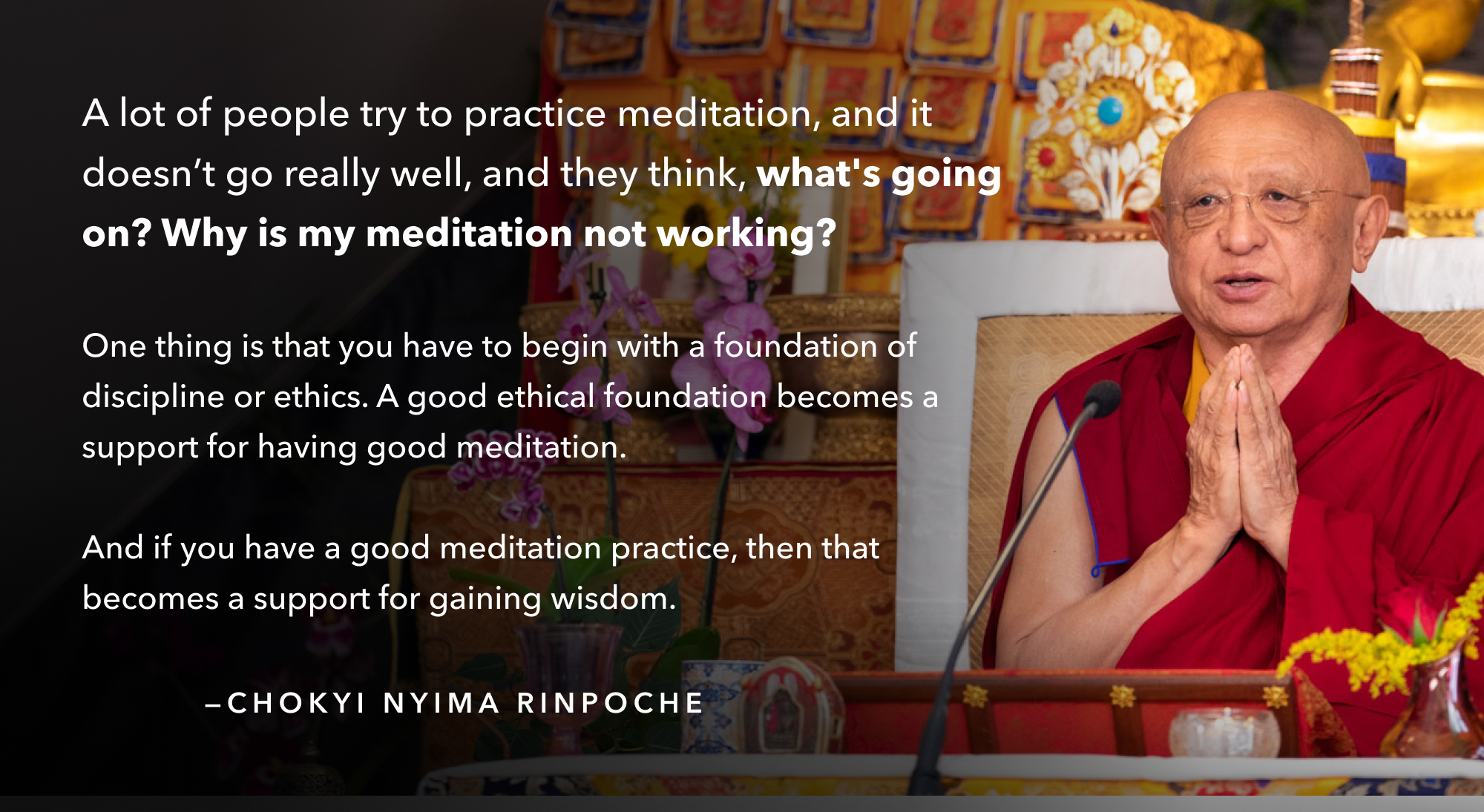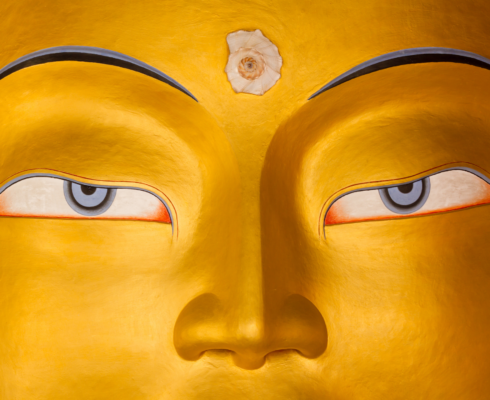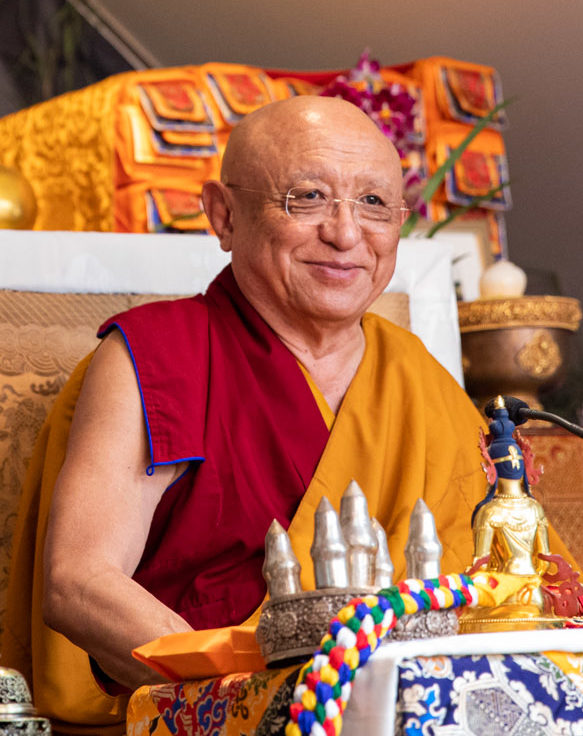
THE WISDOM ACADEMY PRESENTS
Shila, Samadhi, and Prajna
An online course with Chokyi Nyima Rinpoche
Deepen your practice as Chokyi Nyima Rinpoche, world-renowned teacher and meditation master, guides you through this ten-lesson course on meditation and the pith instructions on Buddha nature.
Sign up today for this remarkable experience.
Tuition: $397
This course is in self-study mode, so you can take it at your own pace. After enrolling, check your email for a welcome email with instructions on how to take the course. When you enroll in any Wisdom Academy course, you agree to our terms of use. Enrolled students have lifetime access to course materials. Wisdom is a 501(c)(3) nonprofit. Your tuition supports the creation of more courses like this one. Thank you! For more about our terms, please see the Wisdom Academy FAQ.

Chokyi Nyima Rinpoche, world-renowned teacher and meditation master in the Kagyu and Nyingma traditions, guides students through this ten-lesson course on meditation and the pith instructions on Buddha nature.
Students will learn about the correct motivation for spiritual practice and meditation, as well as the ethical practices focusing on virtue and non-virtue that are the essential foundation for genuine spiritual development.
Teachings on impermanence lay the groundwork that supports the development of compassion, meditation, and the pāramitās. Rinpoche explains the root of blessings in the Mahāmudrā and Dzogchen traditions that leads practitioners on the path to realizing their own Buddha nature.
Tuition: $397
This course is in self-study mode, so you can take it at your own pace. After enrolling, check your email for a welcome email with instructions on how to take the course. When you enroll in any Wisdom Academy course, you agree to our terms of use. Enrolled students have lifetime access to course materials. Wisdom is a 501(c)(3) nonprofit. Your tuition supports the creation of more courses like this one. Thank you! For more about our terms, please see the Wisdom Academy FAQ.

What you’ll learn
• How to make progress on the path of meditation
• About Buddha nature, the mind’s natural state, as presented in the Mahāmudrā and Dzogchen traditions
• An experiential approach to practicing pith instructions
• The practices of virtue and non-virtue
• How to develop a deeper awareness of impermanence and interdependence
• And much more!
If you want to receive guidance from Chokyi Nyima Rinpoche on taming and training your mind, this course is for you.
Rinpoche explains the crucial task of taming the mind, and how realizing impermanence can reduce suffering. Teachings on the three trainings in ethics, meditation, and wisdom illustrate how the trainings support one another throughout the path and create the conditions for awakening.
Tuition: $397
This course is in self-study mode, so you can take it at your own pace. After enrolling, check your email for a welcome email with instructions on how to take the course. When you enroll in any Wisdom Academy course, you agree to our terms of use. Enrolled students have lifetime access to course materials. Wisdom is a 501(c)(3) nonprofit. Your tuition supports the creation of more courses like this one. Thank you! For more about our terms, please see the Wisdom Academy FAQ.

What You Get
10 lessons
20-50+ minutes of lecture per lesson, taught in Tibetan with English subtitles
PDF transcripts of lectures
Guided meditations
Selected readings from key texts
Forum and quizzes

Lesson 1: Abandoning Non-Virtue and Cultivating Virtue
In these introductory lessons, Chokyi Nyima Rinpoche sets the foundation by explaining the root practice of at least avoiding the ten non-virtues, while cultivating, when possible, the ten virtues. Rinpoche explains the crucial task of taming the mind, and how realizing impermanence can reduce suffering.
Teachings on the three trainings in ethics, meditation, and wisdom illustrate how these create the conditions for, and also support one another throughout the path. Quoting from the Pratimoksha Sutra, Rinpoche provides insight into the basis of an ethical practice, and how one can develop this oneself.

Lesson 2: Taming the Attached Mind
In this lesson, Chokyi Nyima Rinpoche discusses taming the attached mind through practicing Buddhadharma. Rinpoche discusses Buddhadharma practice as starting by setting the proper motivation with refuge and bodhicitta, a main practice free from any type of conceptual reference point, and a conclusion with dedication of merit established through the session.
Rinpoche presents an analysis of the objects in which a Buddhist takes refuge, and how these support understanding impermanence on the path of taming the mind.

Lesson 3: Benefits of Meditation
In lesson three, Rinpoche teaches on the value of studying Buddhadharma in order to create the proper understanding and inspiration, which are necessary conditions for effective training on the path. A correct view of the unity of emptiness and compassion gives the necessary bearing for a successful practice.
Chokyi Nyima Rinpoche emphasizes developing a stable and regular meditation practice that focuses on the qualities of renunciation, compassion, and a correct view of impermanence. Bringing the teachings into experience through meditation is what makes realization possible. Realizations cannot be transferred to someone else. But, through hearing the truth of suchness, liberation is attainable.

Lesson 4: Pith Instructions and Experience
Rinpoche goes deeper into the manner of taming the mind, reiterating the importance of setting a foundation in study of the Dharma. Through understanding, one’s ethical practice becomes spontaneous and joyful. These elements calm and clarify the mind, which supports contemplation and meditation. Meditation can then lead to confidence and realizations in the view of dependent origination, out of which compassion naturally and effortlessly arises.
Rinpoche illustrates how direct experiences are the qualification for teaching, and goes on to show how this is a key quality to identify when searching for a teacher.

Lesson 5: Applying the Medicine of the Dharma
Chokyi Nyima Rinpoche emphasizes the teachings on the practical level, explaining that Dharma must be put into use, not merely studied. Seeing that ignorance creates the painful perceptions and consciousnesses that we experience, contemplation and meditation upon dependent origination become a realistic and effective medicine to calm the mind.
Rinpoche teaches how contemplating the impermanent nature of compounded phenomena results in attachments decreasing naturally; successful contemplation and meditation comes from creating the proper causes and conditions.

Lesson 6: Four Thoughts That Turn the Mind
Contemplating the “four thoughts that turn the mind toward the Dharma” serves to help deepen the sense of sadness and weariness a Dharma student feels about the samsaric condition. Rinpoche gives insight on developing awareness of the delusion that suffering sentient beings are ceaselessly caught in; fooled by seeking safety in impermanent objects.
Practice results in a reduction of the obscurations to understanding the way objects function. With a deep foundation in these insights and recognizing the deluded state of others, compassion blossoms effortlessly.

Lesson 7: The Six Paramitas in the Mahamudra and Dzogchen Traditions
Rinpoche details the way the practice of the first five perfections in method provide the basis for successful practice of the sixth perfection in wisdom. Meditation creates the context to change habits and bring these perfections into our lives right now.
Genuinely recognizing—and sustaining the recognition of—emptiness, remaining in equipoise, we come to realize the natural state of the mind. Rinpoche explains how meditation is our “main job.”

Lesson 8: Buddha-Nature and the Natural Mind
Rinpoche asks, “What is it that the obscurations obscure? What are they obscuring?” They’re obscuring suchness; the true nature of things. That basic state of suchness is actually present in all sentient beings without exception. That suchness, buddha nature, is present in all sentient beings.
Rinpoche explains the two wisdoms: wisdom that knows the natural state just as it is, and the wisdom that realizes everything that there is to know.
Outer gurus help us to meet the ultimate guru; the ultimate guru is the nature of your own mind.

Lesson 9: How to Make Progress on the Path
Success in practice gives rise to an understanding of wisdom with respect to emptiness and interdependence. Understanding of these principles should be increasing, becoming sharper when applied in practice to experience.
Rinpoche explains we need to make ourselves able to practice with real joy. Then our mind and character can change, filled more and more with joy.
Buddha nature is present as the basic nature of every single sentient being; we don’t feel good when we do something harmful or negative because our nature is pure. We experience pain and suffering because we are not abiding directly within genuine and intrinsic awareness just as it is.

Lesson 10: The Nature of Mind in Mahamudra and Dzogchen
Chokyi Nyima Rinpoche concludes by explaining that if we don’t recognize the nature of mind, we’re just learning conventions.
The supreme wisdom is one that realizes selflessness. Always looking at one’s own mind is the ultimate practice; again and again returning to and sustaining the recognition of awareness. Rinpoche compares the experience of genuine realization to the sense of reunion of a lost child and mother.
Tuition: $397
This course is in self-study mode, so you can take it at your own pace. After enrolling, check your email for a welcome email with instructions on how to take the course. When you enroll in any Wisdom Academy course, you agree to our terms of use. Enrolled students have lifetime access to course materials. Wisdom is a 501(c)(3) nonprofit. Your tuition supports the creation of more courses like this one. Thank you! For more about our terms, please see the Wisdom Academy FAQ.
1) If you want to learn how to tame your mind from one of the great meditation masters of our time
2) If you want to deepen your understanding of how to practice the Threefold Training
3) If you want to receive Mahamudra and Dzogchen teachings from one of the most beloved teachers in the world
Tuition: $397
This course is in self-study mode, so you can take it at your own pace. After enrolling, check your email for a welcome email with instructions on how to take the course. When you enroll in any Wisdom Academy course, you agree to our terms of use. Enrolled students have lifetime access to course materials. Wisdom is a 501(c)(3) nonprofit. Your tuition supports the creation of more courses like this one. Thank you! For more about our terms, please see the Wisdom Academy FAQ.
 Tulku Chokyi Nyima Rinpoche was born into the Tsangsar family as the first-born son of Tulku Urgyen Rinpoche in 1951. At 18 months of age, Chokyi Nyima Rinpoche was recognized as the 7th incarnation of the Drikung Kagyu lama, Gar Drubchen, a Tibetan mahasiddha and spiritual emanation of the renowned 2nd century Indian Buddhist philosopher, Nagarjuna.
Tulku Chokyi Nyima Rinpoche was born into the Tsangsar family as the first-born son of Tulku Urgyen Rinpoche in 1951. At 18 months of age, Chokyi Nyima Rinpoche was recognized as the 7th incarnation of the Drikung Kagyu lama, Gar Drubchen, a Tibetan mahasiddha and spiritual emanation of the renowned 2nd century Indian Buddhist philosopher, Nagarjuna.
Chokyi Nyima Rinpoche trained at the Young Lamas’ School in Dalhousie, India, and the Kagyu School of Tibetan Buddhism, where he studied under the guidance of such eminent masters as His Holiness the 16th Gyalwang Karmapa, Kyabje Dilgo Khyentse Rinpoche, and Kyabje Tulku Urgyen Rinpoche.
At the command of the 16th Karmapa, the family established Ka-Nying Shedrub Ling Monastery just north of the Great Jarung Khashor Stupa in Boudhanath. In 1976, H.H. the Karmapa instructed the then 25-year-old Rinpoche to become the monastery’s abbot. Chokyi Nyima Rinpoche also established the Rangjung Yeshe Institute for Buddhist Studies (RYI), an international Buddhist college; Rangjung Yeshe Publications; the Dharmachakra Translation Group; and the charitable organization Shenpen.
For over 40 years, Chokyi Nyima Rinpoche has overseen the welfare and spiritual education of almost 700 monks and nuns who primarily reside at Ka-Nying Shedrub Ling Monastery, Asura Cave Retreat Centre, and Nagi Gompa Hermitage. His heartfelt wish is to double this number of ordained practitioners. Much of Rinpoche’s everyday life is devoted to the spiritual needs of the local congregation of both Tibetan and Nepalese lay practitioners.
Chokyi Nyima Rinpoche has established nine Gomde retreat centers around the world, along with several Dharma House city centers, where students gather to study and practice. The website Shedrub.org introduces the many Dharma activities of Chokyi Nyima Rinpoche and Dharmasun.org offers a wealth of online teachings.


